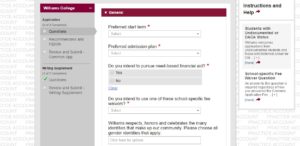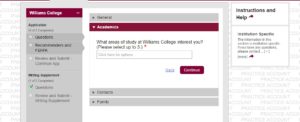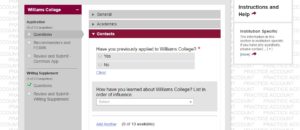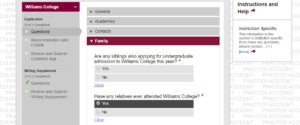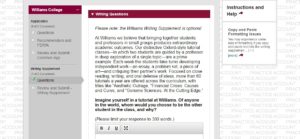The Ultimate Guide to Applying to Williams
Established in 1793, Williams College is located in rural Williamstown, Massachusetts. Williams is well-known as a top-tier liberal arts college, currently ranked first among liberal arts colleges in US News & World Report.
Williams has 24 departments and 33 majors across three academic curricular divisions, including humanities, sciences, and social sciences, as well as two small master’s degree programs in art history and development economics. In lieu of minors, students may pursue concentrations, which are groupings of courses focused on topics drawn from multiple disciplines. Current concentrations include Africana Studies, Biochemistry & Molecular Biology, and Justice and Law, among nine other topics. Popular majors include Economics, History, Psychology, English, and Political Science.
A unique aspect of the Williams curriculum is the tutorial, modeled after the Oxford University style of education. Two students are paired under the guidance of a professor, and take turns developing an independent work, such as an essay or project, and critiquing it. Williams offers 60 to 70 tutorials each year across the curriculum, and more than half of the study body takes advantage of the opportunity to participate and develop critical thinking, writing, and other important skills.
Statistics, Deadlines, and Financial Aid
Williams is a highly selective school, with an admissions rate of 16.8% for the class of 2020. For this class, 1,603 candidates were offered a position on the waitlist, from which 53 applicants were admitted.
Students may apply Early Decision, which is binding, meaning you are expected to matriculate at Williams if accepted, or Regular Decision. Early Decision candidates must submit their applications by November 15th and will be notified of their decisions by December 15th. Admitted students must reply by January 2nd. Regular Decision applications are due January 1st, and candidates will receive their admission decisions by April 1st. Admitted students must reply by May 1st.
Williams has a need-blind admission policy, meaning the admissions committee makes its decisions without regard for students’ ability to pay. Tuition costs $51,490 per year, and total costs amount to about $65,480 per year including room, board, and other fees. For Early Decision applicants, CSS Profile and prior year tax returns are due November 20th, and final aid application requirements are due April 15th. For Regular Decision Applicants, CSS Profile and FAFSA are due February 1st, and tax documents are due to IDOC April 15th. A Net Price Calculator is available to estimate your cost of attending Williams.
Applying to Williams
Williams accepts the Common Application, Coalition Application, or QuestBridge Application, along with the William supplement.
The supplement has four question sections and an optional writing supplement.
General
In this section, you will enter your start term of Fall 2017, the only available option. You will also indicate whether you are applying Early Decision or Regular Decision, if you are plan on applying for financial aid, and if you intend to use a fee waiver. You may list all gender identities that apply to you, but are not required to do so. Please note that Williams does not discriminate in any way, and your gender identity will not influence your admission decision. You will also state if you are planning to submitting a visual or performing arts portfolio via SlideRoom.
Academics
Here, you will list up to three areas of study at Williams (majors or concentrations) that interest you. You don’t need to list all three, but you should list at least one. Keep in mind that you are not declaring a major here, but simply giving the admissions committee an idea of what your current interests are.
Contacts
This section asks if you have previously applied to Williams. You will also list up to ten ways you learned about Williams. You do not need to provide all ten ways, but should list at least one or two. If you list more than one, add them in order of influence. You will also have the opportunity to add a cell phone number to receive automated calls or texts from Williams.
Family
Here, you will indicate if you have any siblings applying for undergraduate admissions to Williams this year, or if you have had any relatives who attended in the past. If you answer yes, you will be prompted for names, relationship to you, and degrees received. This form specifies parents, stepparents, guardians, grandparents, siblings, aunts, uncles, or cousins, but you may add other relatives if you wish. You may also indicate if you have and relatives who ever worked for Williams, and their relationship to you, names, and titles.
Writing Supplement
Although the Williams writing supplement is optional, when you are one applicant among a standout group of candidates at a highly selective school, it is always a good idea to give yourself an extra edge. Unless there is a reason why the supplemental essay might be detrimental to your application, you should complete the essay—and make it outstanding.
The writing supplement asks the following question:
At Williams we believe that bringing together students and professors in small groups produces extraordinary academic outcomes. Our distinctive Oxford-style tutorial classes—in which two students are guided by a professor in deep exploration of a single topic—are a prime example. Each week the students take turns developing independent work—an essay, a problem set, a piece of art—and critiquing their partner’s work. Focused on close reading, writing, and oral defense of ideas, more than 60 tutorials a year are offered across the curriculum, with titles like “Aesthetic Outrage, “Financial Crises: Causes and Cures, and “Genome Sciences: At the Cutting Edge.”
Imagine yourself in a tutorial at Williams. Of anyone in the world, whom would you choose to be the other student in the class, and why? (Please limit your response to 300 words.)
This essay will take a bit of planning. To begin, you should thoroughly research the Williams tutorials, so you understand exactly what the question is asking. Look into what kinds of tutorials Williams has held in the past. You should also think about what intellectual pursuits or skills you would like to hone. Consider making a list and narrowing it down to the topics that peek your curiosity the most. Next, think about people who might help you grow in the areas you have chosen. It could be a friend, family member, or even a famous person. If it is someone the members of the admissions committee might not know, be sure to describe him or her in detail. Choose someone who could give you good advice and help you intellectually. For more tips on writing the Williams supplemental essay, check out our “How to Write the Williams College 2016-2017 Essays” post.
Additional Application Materials
Along with the application, Williams requires SAT or ACT scores, a secondary school report (sent by your guidance counselor), two teacher recommendations, a $65 application fee, and a mid-year report.
Williams does not offer interviews. Rising high school seniors may speak with admissions offers during the summer, but the conversations do not factor into your admissions decision.
If you have a special talent in visual or performing arts, you may submit a portfolio showcasing your work through SlideRoom.
You may also submit scientific research abstracts if you have conducted scientific or mathematical research and are planning on pursuing research in college. You may submit these with your application or email applicationmaterials@williams.edu.
The Williams application has fewer requirements than some of the other top-tier schools, but given its low acceptance rate and high prestige, you should still work hard to create a stellar application. Good luck!
Curious about your chances of acceptance to your dream school? Our free chancing engine takes into account your GPA, test scores, extracurriculars, and other data to predict your odds of acceptance at over 500 colleges across the U.S. We’ll also let you know how you stack up against other applicants and how you can improve your profile. Sign up for your free CollegeVine account today to get started!
